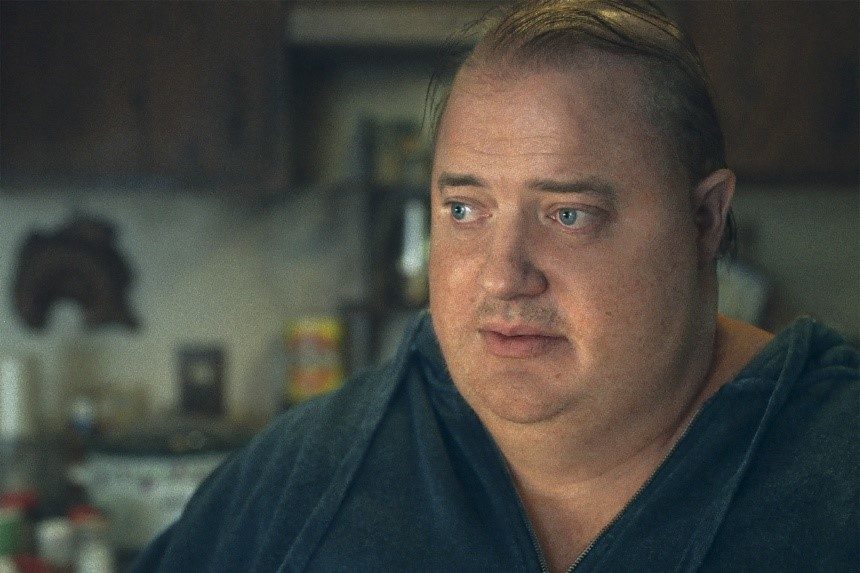The Whale
⭐️ ⭐️ ⭐️⭐️
Rating: R
Run Time: 1 hour 57 minutes
Stars: Brendan Fraser, Sadie Sink, Ty Simpkins, Hong Chau, Samantha Morton
Writer: Samuel D. Hunter
Director: Darren Aronofsky
Reviewed at the Toronto International Film Festival
“Who would want me to be part of their life?” mourns Charlie, a socially awkward, grossly obese, middle-aged recluse who spends each miserable day barely rising from his overstuffed chair in a book-and-food-wrapper-strewn apartment, somewhere in northern Idaho.
Self-pity aside, Charlie’s is a fair and honest question. The fair and honest answer: Nobody. But the miracle of The Whale, a drama that offers few moments of hope and no truly happy resolutions, is that you stick with this guy through thick and thicker, simultaneously repulsed and intrigued thanks to a fierce performance of a lifetime by Brendan Fraser.
Under what can only be described as a mountain of prosthetic poundage, Fraser — with that melodic voice and those piercing blue eyes — draws us into Charlie’s self-constructed prison. So enormous is Charlie that he can barely walk. He struggles to breathe. He has estranged himself from his daughter, barely communicates with the ex-wife who still worries about him, and even insists that the pizza delivery guy who brings his daily double dose of artery-clogging sustenance drive away before he’ll lumber out to the front porch to fetch it.
Charlie endures his bloated, solitary life in a second-floor walkup which, it is clear, he will never leave under his own power. He teaches an online college English literature course via Zoom, never showing himself to his students, always complaining that his laptop camera doesn’t work.
“You’re not missing much,” he assures them.
Well, yes and no. Director Darren Aronofsky provides no slow reveal of Charlie’s condition: Within the first minute we get the full picture: Charlie is not just overweight; he’s hundreds and hundreds of pounds too heavy. His eyes peer from his round, quivering face like marbles in a dough sculpture. His fingers, clumsily clicking away on his keyboard, resemble stubby sausages. Charlie rises on his legs — thick as tree stumps and disappearing into his slippers without so much as a hint of ankle — only to head for the bathroom or bedroom down a treacherously narrow hallway.
Of course Charlie is an emotional eater. He cries easily. He laughs almost as readily, but the exertion always leaves him gasping for breath, clutching his chest in pain as his failing heart tries to keep up with all those extra miles of blood vessels.
Charlie is dying. He knows it. If you’re hoping for a story of physical redemption, you should probably look elsewhere. It’s Charlie’s emotional journey we’re here to witness; his final accounting; his flailing attempt to heal the wounds he has inflicted on others in his spiral to self-destruction.
Feeling the end is near, Charlie calls his 16-year-old daughter, Mary (Sadie Sink), whom he has not seen since she was 8. A fast-talking, chip-on-her-shoulder teen, Mary agrees to spend time with her dad only when he offers to pay her — and even then, their daily spitefests are so bitter one would expect violence to erupt if only Charlie could raise his hands above his waist.
These father-daughter grudge matches make up most of The Whale’s run time, and Sink brings a nice mix of barely submerged vulnerability and hell-hath-no-fury rage to the role. Their extended sessions of razor-sharp back-and-forth do betray The Whale’s roots as a stage play (Samuel D. Hunter adapted his original script), and the claustrophobic setting never shakes the feel of having been created by a theatrical designer.
There’s also a lot of theatrical door slamming by a parade of characters, including that soft-hearted nurse (Hong Chau), an earnest Christian missionary (Jurassic World’s Ty Simpkins), Charlie’s ex-wife (Samantha Morton), and, of course, the pizza guy (Sathya Sridharan). Nearly all engage in that uniquely stagey trope where characters stalk toward the exit saying, “I’m leaving” — then hesitate, spin back, and stick around for another 20 minutes to get something else off their chests.
Director Aronofsky has made a career of films that tremble with operatic intensity, ranging from the masterful (Requiem for a Dream) to the unforgivable (Mother!). The Whale is, for him, uncharacteristically subdued; he knows what he’s got in Fraser, an actor of uncommon empathy, who needs no external telegraphing to raise his audience’s emotions.
The cynic would dismiss The Whale as classic Oscar bait for Fraser; a calculated move to resurrect a career that has, in recent years, seemed sadly adrift. For reasons covered in excruciating detail elsewhere, a long series of health issues have caused the once-hunky George of the Jungle star to gain considerable weight over the past several years (although nothing remotely to the degree Charlie experiences). He has worked steadily, but mostly in supporting roles. This, a part roiling with seething anger and over-the-top anguish, is just the sort of thing that can not only restore a career — it can propel an artist to unprecedented heights of glory.
There are a lot of people rooting for Fraser, one of Hollywood’s most beloved figures. But there’s no need for charitable goodwill here: In The Whale, Brendan Fraser re-establishes himself as a screen actor of the first rank.
Become a Saturday Evening Post member and enjoy unlimited access. Subscribe now




Comments
Mary is the mothers name.. Ellie is the daughter, not Mary as stated
Maryvis the motgees name.. Ellie is the daughter, not Mary as stated